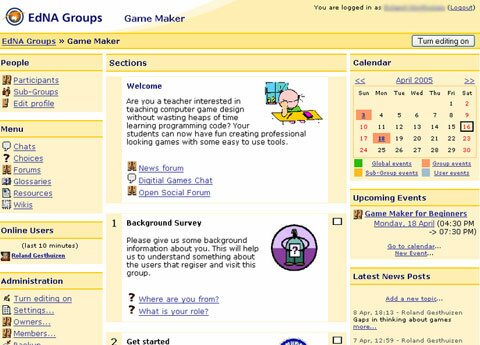Open University Is Going Mobile 
 |
|
 |
|
|
|
The Open University's (OU's) expertise in supported distance learning has always meant it being a leader in developing the best technology to support its students. Now, its Learning and Teaching Office has started a new programme worth nearly £5 million to build a comprehensive online student learning environment.
The development, which will first appear in May of 2006, and be fully operational for February 2007 courses, will see the largest use of Moodle in the world. Moodle is a free, open source software package course management system used by educators to create effective online learning communities.
Currently, Open University students use a variety of software in a network to access their course work, interact with tutors and other students, use the library, submit assignments and handle administrative paperwork. The new development incorporating Moodle will ensure the network is much more user-friendly and uniform.
Dean Taylor, the programme manager of the OU's Virtual Learning Environment (VLE), says, 'We see the development of Moodle applications, along with involvement of the Moodle open source community giving our students a great advantage in e-learning. Plus, the innovations added by the OU will be available to the entire Moodle community. It's a two-way creative street.'
Martin Dougiamas, Moodle community leader and lead developer, says he is very proud that the OU has chosen Moodle as the platform for its next generation of Internet-based courses. 'By joining our community they are recognising the great value of the open source paradigm and the power of a social constructionist approach to both learning and development. At the same time, as one of the largest, oldest and most respected practitioners of distance education in the world they bring resources and experience that will give Moodle development a tremendous boost in the coming years,' he says.
The Open University's Pro Vice-Chancellor for Learning and Teaching, Dr Paul Clark, says: 'The Open University has always been a leader in developing technology for e-learning, and this new student-centred technology is the next logical step. The OU has the top student satisfaction rating in the National Student Satisfaction Survey in England, Wales and Northern Ireland, and this new student environment we're creating will only help to ensure that people who learn with the OU continue to receive an exemplary educational experience.'
Moodle is an open source e-learning platform that has a relatively large user base. It's a software package designed to help educators create quality online courses. Such e-learning systems are sometimes also called a Learning Management System (LMS), Course Management System (CMS), Virtual Learning Environments (VLE), education via computer-mediated communication (CMC) or just Online Education.
The word Moodle was originally an acronym for Martin's Object-Oriented Dynamic Learning Environment, a definition mostly useful to programmers and education theorists. Later on Martin Dougiamas, the original developer after whose name the 'M' in Moodle comes, changed the Acronym in Modular Object-Oriented Dynamic Learning Environment.
Moodle has been evolving since 1999 (since 2001 with the current architecture). Current version is 1.5, which was released on 6 June 2005. It has been translated into 61 different languages. Major improvements in accessibility and display flexibility have been developed in 1.5. As of May 2005, more than 3300 sites from 114 countries have registered their Moodle installation. The real number of current active Moodle installations is unknown, but largest single site has reported over 6000 courses and over 30000 students.
The development of Moodle continues as a Free Software project supported by a team of programmers and the user community all over the world. This means, that users are free to download, use, modify and even distribute it (under the terms of the GPL License from GNU). Moodle runs without modification on Unix, Linux, FreeBSD, Windows, Mac OS X, NetWare and any other systems that support PHP, including most Web host providers. Data is stored in a single database: MySQL and PostgreSQL are best supported, but it can also be used with commercial databases, ADO and generic ODBC database access, since it uses ADOdb.
BIOS, Nov 10, 05 | Print | Send | Comments (0) | Posted In Educational
 Ramesys: Building Better Partnerships Ramesys: Building Better Partnerships
 High-Tech Schools May Have Got It Wrong High-Tech Schools May Have Got It Wrong
 Bolton University Inspires Tomorrow's Geeks Bolton University Inspires Tomorrow's Geeks
 Bloomsbury Consortium Turns to Blackboard to Host e-Learning Platform for Four Institutions Bloomsbury Consortium Turns to Blackboard to Host e-Learning Platform for Four Institutions
 Back To School Goes High Tech Back To School Goes High Tech
 New Type Of Literacy For Digital Age Children New Type Of Literacy For Digital Age Children
 Blackboard appoints Tim Collin as Vice President, Europe Middle East and Africa Blackboard appoints Tim Collin as Vice President, Europe Middle East and Africa
 NetSupport Announces NetSupport School 8.5 Computer Lab Management Software NetSupport Announces NetSupport School 8.5 Computer Lab Management Software
 Don't Let Your Kids 'Check Out' For Summer Don't Let Your Kids 'Check Out' For Summer
 Broadband Makes Higher Incomes A Reality For Language Tutors Broadband Makes Higher Incomes A Reality For Language Tutors
More...
|

